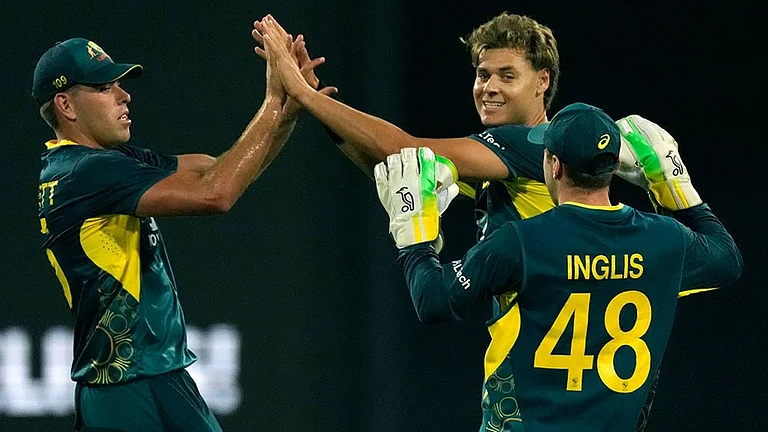The residence of three-time former Chhattisgarh CM Raman Singh in Raipur has been swarming with supporters and party workers in a celebratory mode. After several rounds of counting, the Bharatiya Janata Party (BJP) has emerged in the lead with projected wins in at least 56 seats, as per the Election Commission website at the time of writing. Defying exit poll predictions and last-minute poll analyses favouring the Congress and the latter’s claim to win 75 seats, the BJP is likely to form the government in Chhattisgarh, as well as in Rajasthan and Madhya Pradesh where the party is currently in the lead.
Connecting with Outlook on his way out of Raman Singh’s jubilant residential quarters, Raipur-based political commentator and scribe Sudhir Azad Tamboli said that the BJP has managed to pull off a sleeper victory and blamed the Congress’ complacence and internal bickering for the party’s downfall. “The two-way fight between TS Singh Deo and Bhupesh Baghel had an impact on voters’ psyche. The BJP, on the other hand, did not project any clear face as CM and instead focused on addressing local issues through their well-planned manifesto,” Azad says.
Among the host of promises made by the BJP in their manifesto were schemes to provide Rs 12,000 every year to married women, gas connections at Rs 500, Rs 18 lakh under the PM housing scheme house, and up to Rs 10 lakh claims under Ayushman Bharat Yojana. It promised to purchase tendu patta at Rs 5,500 per standard bag and provide a bonus of Rs 4500 for additional collection. It also promised the development of five Shakti Peeths across Chhattisgarh and announced the Ramlala Darshan scheme for the poor of the state to visit the Ram temple in Ayodhya. The BJP seems to have outperformed the Congress in both North and South Chhattisgarh which include the crucial Surguja and Bastar belts. “The women’s vote, farmers’ vote as well as the Adivasi vote seems to have favoured the BJP,” Azad adds.
While the Congress had banked on welfare schemes as its primary poll pitch, the party could not rise above sentiments of anti-incumbency, much of which was caused by the poor implementation of welfare schemes, especially in areas like Bastar and Surguja. “The Congress did launch several schemes like the Godhan Nyay Yojana to benefit farmers and it worked. But the benefits failed to reach large sections of farmers in need,” Azad alleges.
When Outlook travelled to Bastar during the first phase of the polls, it found many villages across districts lacking basic amenities like running water, active schools or public health centres. Locals complained of lack of jobs and “punjivadi development”. “Adivasi voters did not forget the Silger protests that have continued since 2020 and spread to other parts. There was anger against the government for neglecting the demands of the Adivasi population,” Bastar-based independent journalist Raunak Shivhare said.
He adds that another factor that helped the BJP secure votes in tribal belts was the rise in communal tensions between Adivasi and Christian Adivasi communities which flared up in Narayanpur last December. “While Narayanpur was specially highlighted, Adivasis across tribal belts in Bastar including Sukma and Dantewada have become divided on this communal issue and many have felt alienated by the Congress’ lack of support for indigenous or Hindu Adivasi communities,” the Dantewada resident said. Christian tribals have also felt alienated by the party, with representatives of the community stating that the government did not come to their aid when communal violence broke out.
Congress’ welfarism agenda was also dampened by the BJP’s constant attacks and allegations of corruption. Star campaigners of the BJP in Chhattisgarh including PM Modi targeted the Baghel government over the Enforcement Directorate (ED) cases like coal levy, illegal liquor sale and Mahadev app. Congress party president Mallikarjun Kharge struck an optimistic note on Twitter, posting about rebuilding and reviving the party in Chhattisgarh and the two other states where the BJP is in the lead. But for supporters of the Congress across Chhattisgarh, the mood is glum. Images of the deserted party office have made it to social media. Meanwhile, Raman Singh who has been the driving force behind BJP’s campaign in Chhattisgarh is the most likely CM face for now. Speaking to reporters midway through counting, a confident Singh attributed the victory to “Modi’s guarantee”.
He said, "The people believed in Modiji's guarantee, that's what the trends show. We could see the undercurrent but didn't know it would be this huge. Bhupesh Baghel has been rejected by Chhattisgarh." When asked who would be the CM, the veteran leader left it to the discretion of the party, saying, “I never asked for anything, whatever job I was assigned, I did it with total dedication."
If the current trend translates into results, the BJP would have scripted its biggest victory yet in the assembly elections in the state since it was carved out of Madhya Pradesh in 2000.


























